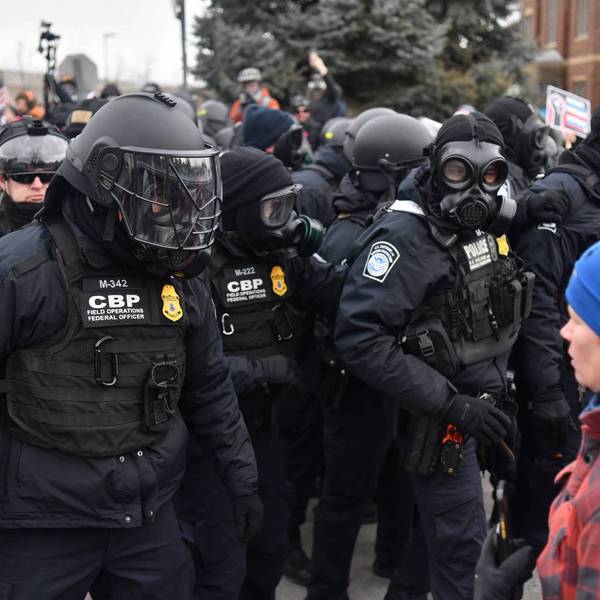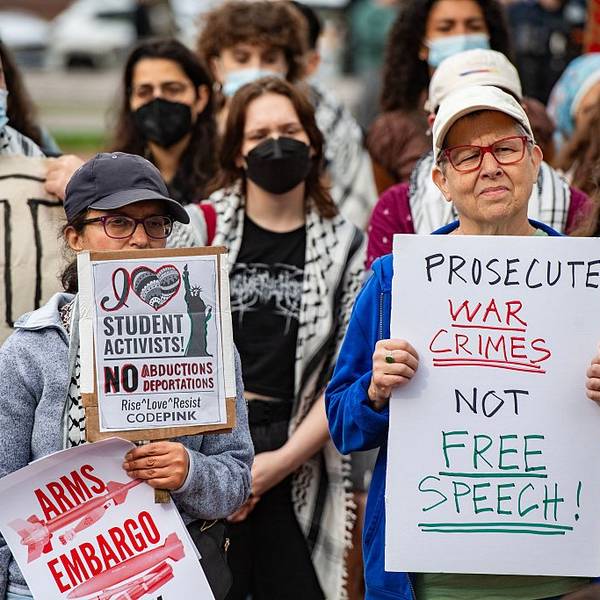President Donald Trump is meeting Monday with Egyptian President General Abdel Fattah el-Sisi--who's overseen a "brutal human rights crackdown"--with the U.S. president telling the autocrat: "You have a great friend and ally in the United States and in me."
Trump's warm reception for Sisi follows chumminess between the two even before the real estate mogul moved into the White House. Trump had praised the "chemistry" between the two and called Sisi "a fantastic guy."
A press statement released last week by the White House said the leaders would "build on the positive momentum they have built for the United States-Egypt relationship."
Human rights organizations had urged Trump to use the meeting to pressure Sisi over vast human rights violations, but given the praise they previously bestowed upon each other, their appearance at a press conference on Monday, and a statement from the White House, there appears to be no chance of that happening.
"As President Sisi visits the White House, his government is overseeing a campaign of repression that flies in the face of American values," declared Maya Foa, a director at human rights organization Reprieve.
Outlining that repression, Tom Porteous, deputy program director at Human Rights Watch, wrote:
Weeks after overthrowing Egypt's first democratically elected president, Mohamed Morsi, in July 2013, Sisi's security forces stormed pro-Morsi protest camps in Cairo, killing at least 817 people in one day, the worst peacetime massacre of Egypt's modern history.
Since then, the right to protest has all but vanished in Egypt. Police routinely suppress anti-government demonstrations with violence.
The authorities have imprisoned tens of thousands of political opponents of Sisi's government, often in appalling conditions, with lack of access to medical care that in some cases has led to death.
Police and National Security agents routinely use torture and enforced disappearances against criminal suspects and political opponents alike with near impunity.
In North Sinai, the military commits egregious abuses including extrajudicial executions and unjustified home demolitions in its fight with the local franchise of the extremist group the Islamic State in Iraq and Syria (ISIS).
Prosecutions, travel bans and asset freezes against human rights defenders as well as repressive new legislation threaten to erase independent civil society and dissent. The authorities deny workers the right to organize and aggressively prosecute those who participate in strikes.
Yet, CNN writes,
In a statement describing the U.S.-Egypt partnership given to reporters Friday, the White House did not mention the nation's human rights abuses, which the State Department has said includes the suppression of free speech, torture, forced disappearances, and lack of due process. Instead the statement praised Sisi for taking "a number of bold steps since becoming president in 2014, including calling for the reform and moderation of Islamic discourse and initiating courageous and historic economic reforms."
And, in a stark contrast to the press conference he had with German Chancellor Angela Merkel, Trump said of Sisi Monday: "We agree on so many things. I just want to let everyone know, in case there was any doubt, that we are very much behind President al-Sisi... he's done a fantastic job in a very difficult situation. We are very much behind Egypt and the people of Egypt and the United States has, believe me, backing--believe me, we have strong backing." (Some observers also noted that while Merkel was offered no handshake, Sisi got two from Trump.)
Ahead of the visit, Amnesty USA urged Trump not to "turn a blind eye to Egypt's human rights crisis."
"Trump has the opportunity to hold Egypt's government to account for its brutal human rights crackdown, including mass arbitrary arrests and killings of dissidents, enforced disappearances, and blatantly unfair trials," said Sunjeev Bery, advocacy director at Amnesty International USA. During his meeting with Sisi, "Trump must make clear that the extent of diplomatic relations with the U.S. depends on Egypt's willingness to address its human rights abuses," Bery said.
"Neither side in this relationship seems interested in promoting human rights," added Sarah Margon, Washington director at Human Rights Watch. "Inviting al-Sisi for an official visit to Washington as tens of thousands of Egyptians rot in jail and when torture is again the order of the day is a strange way to build a stable strategic relationship," she said.
The situations of those prisoners was the impetus for a Sunday vigil at the Washington Monument, about a mile from where Sisi and Trump would be meeting.
"We're giving $1.5bn to an autocrat who has killed thousands of people, who has imprisoned tens of thousands of people, including Americans," demonstrator Mohamed Soltan, an American who was jailed in Egypt for nearly two years, said to Al Jazeera. "We're here to shed light on their plight."
The Guardian notes that
Trump's choice to welcome Sisi to the White House contrasts with that of his predecessor.
The U.S. capped the aid it provides to Egypt in October 2013, shortly after Sisi seized power, reducing it to $1.3bn in annual military assistance and preventing the sale of some larger items such as fighter jets.
The Obama administration also repeated demands for Egypt to refrain from the mass trials, widespread jailing of opponents and crackdown on civil liberties that swept Egypt under Sisi's rule. While the aid cap was lifted in 2015, relations remained frosty until Obama's exit.
Still, independent journalist Sharif Abdel Kouddous noted at The Nation: "Egypt has been a close ally of the United States for nearly four decades and is the second-largest recipient of U.S. military aid, after Israel. Despite Sisi's crackdown, the Obama administration did little to alter that relationship."



